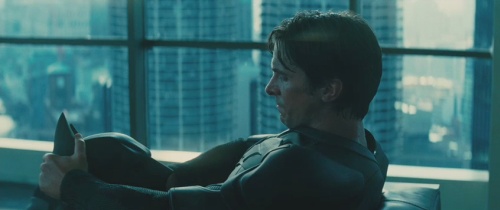The Dark Knight (Christopher Nolan, 2008)
I was not one of those who flipped for Christopher Nolan’s Batman Begins: as I said in a brief write-up at the time, I thought it was poorly shot and thematically muddled. But the more serious problem was just that it was too not fun. That, of course, was supposed to be the point: Nolan was taking us back to a dark version of the Batman character after the more comic bookish 80s and 90s movie version (although I can remember when Burton’s 1989 take was considered the return to a dark take on the character). However, while I applaud the concept of taking a genre project seriously, part of doing a serious superhero film is that you have to make the superhero side of the equation work also. In Batman Begins, Nolan and his co-screenwriter David S. Goyer dropped that ball through their determination to make Batman plausible as something other than a genre conceit. There was a feeling that they were ticking off explanations for things the audiences would have taken for granted: look – it kind of makes sense that he has all these gadgets, because the Wayne foundation has this big R&D branch! Look – here’s an explanation of how he can use his cape to fly! Look – here he is putting together his damn suit! We didn’t need to see that stuff, and by seeming simultaneously apologetic about Batman’s ridiculousness, while at the same time trying to make the most earnest Batman movie ever, I think Nolan came across as a little foolish. A Batman film can explore serious themes, sure, but at the end of the day it is still, as Jaime Weinman put it, about “a rich kid with no powers who decides to avenge his parents by fighting crime in a bat suit.” The best way to sell that kind of idea is to relax and have fun with it, and on that score I don’t think Batman Begins worked very well at all.
By now you have probably heard that Nolan’s sequel The Dark Knight is the ultimate descent into hell for Batman, and you are probably thinking that I would feel it suffered the same problem. It is after all, a very grim film indeed, in which Heath Ledger’s psychotic Joker wreaks widespread havoc and inflicts real and lasting harm to several major characters. Yet, oddly, despite all the carnage that unfolds, The Dark Knight is much more fun than its predecessor. And it’s the nifty trick of making such a dark film so enjoyable that makes it something really worthwhile.
